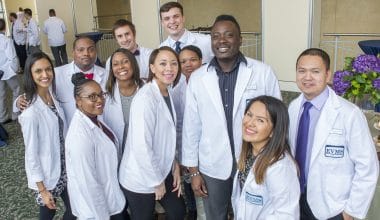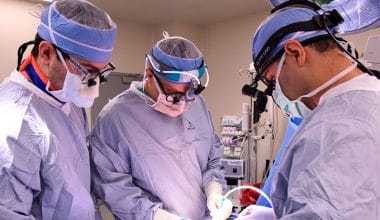The medical school interview is a big part of the admission process. Just like other application processes, once you nail it, you’re a step ahead to becoming a doctor.
There are hundreds, if not thousands, of questions that might come up in any school’s interview process. In this article, we will highlight the most common questions you may encounter during the medical school interview.
Not just that, we will provide you with some clear guidance on how to think about and approach these questions in a personal way that reflects who you actually are.
Table of contents
Why Medical School Interview Questions
An interview is a key to getting accepted into the medical profession. As a physician, you’ll be interacting with patients, nurses, colleagues every day. For this reason, med schools conduct interviews to know if you are fit for medicine in person beyond your application materials.
- Academic readiness (GPA and MCAT score; check out our list of the average GPA and MCAT score of matriculants at every US medical school.)
- Desire and fitness for becoming a physician
- Demonstrated longstanding commitment to medicine
- Likelihood to gel with a particular school’s culture and offerings
How Do I Prepare For Medical School Interview
Med interview questions vary according to schools. In some medical schools, you could have a panel interview with a number of different personalities, others conduct an open interview in which the interviewer can ask you anything they want.
Regardless of the institution and type of interview, adequate preparation is key. You have to prepare for unexpected questions and events that may occur in the interview. The tips below will guide you on how to best approach any medical school interview questions.
#1 Know the School and the Interview Style
Medical interviews come in different formats, it can be an MPI, MMI, A Panel or a combination of two. You have to know the type of interview you will be attending.
Do some background research on the med school you are interviewing too. Know their mission statement, values, academic curriculum, etc. This can go a long way in showing your interviewers why you’re a good fit for their program and also developing questions to ask on interview day.
You can achieve this by visiting the school website and also talking to one or two students who attend there.
#2 Study Smart
Another great way to prepare for a med school interview is to practice your AMCAS and secondary application inside and out. You can list a certain detail or cover a specific experience on your application and be ready to discuss it in more detail during your interview.
Additionally, there are plenty of interview past and answers questions for various interview styles online like the ones you will see in the latter part of this publication. Use these resources and practice saying your responses out loud under timed conditions. You can ask your friends to help you do a mock interview.
#3 Be honest
During a medical interview, you have to keep you response very clean as you may be disqualified if you tell a lie. Med interviewers have so many experience and that makes it easy for them to get the truth.
In addition the above points, once you receive an invitation to an interview, do not procrastinate, confirm immediately. Communication with the medical school is critical. Know the interview schedule in advance if it is at all possible. If the entire schedule is not available, find out at least the time that your interview will begin.
Common Medical School Interview Questions
An invitation to an interview serves as validation for your years of hard work, and also confirms that your application up to that point is “good enough” to help you get into medical school and pursue your dream of becoming a physician.
Below are the most common and recurring questions that you may encounter during your medical interview.
Personal Questions
- Tell me about yourself
- What are your greatest strengths and weaknesses?
- What travels have you taken and what exposure to other cultures have you had?
- Why should we choose you over other applicants?
- Have you completed any research projects or are you interested in research?
- Do you have any particular populations you would like to work with? Have you worked with this type of population in the past?
- What do you do for fun?
- What books have you read recently?
- If you could invite 4 people to dinner who would they be?
- What do you do in your spare time?
- Who is your hero and why?
- How can you tell if someone is truly compassionate?
- If someone 15 years from now were to write a book about you, what would you want to be included in that book?
- What distinguishes you from other candidates?
- What does integrity mean to you?
- How do you handle failure?
Ethical dilemmas/critical thinking Questions
- Do you think medical personnel should tell a patient he/she has eight months to live?
- Would you practice in a rural area? What do you think happens to people who practice there?
- How can you minimize healthcare costs?
- If there were an accident on the highway, would you stop and help the victims if it could lead to a malpractice claim against you?
- If you had a choice to give a transplant to a successful elderly man or a young drug addict, who would you chose?
- How would you deal with a terminally ill patient?
- If you discovered a classmate cheating, what would you do?
- Do you think there should be mandatory HIV testing for couples that want to be married?
- Do you prefer to provide less effective medicine to more people or more effective medicine to fewer people?
- If you had a magic pen, how would you fix healthcare in America?
Core Medical Questions
- What experiences have you had in a medical or clinical setting?
- What should be done about the shortage of medical specialists and adequate resources in rural settings?
- How do you envision using your medical education?
- What is the difference between Medicare and Medicaid?
Tell me about yourself
This is a typical open-ended question. However, while approaching a question such as this, you need to carefully put the following into considerations.
- Your name
- Where you’re from.
- Meaningful youth experience.
- Formal academic training (and previous careers if applicable).
- Meaningful characteristic and story.
What should be done about the shortage of medical specialists and adequate resources in rural settings?
When you encounter this kind of question, you simply know that your interviewer is asking for your perspective on health disparities faced by rural areas. They are most likely intrested in knowing some of the most commonly-touted solutions, from non-governmental and governmental organizations. So, your best approach are;
- First, tell your interviewer about the health disparities faced by rural areas
- Explain the root causes and drivers.
- Explain one or two commonly-cited solutions.
- Tell them your take is on the most important issue.
Have you completed any research projects or are you interested in research?
This question may appear easy because you would have listed it in your application. Also, it is a great interview question because It shows interest and also displays your future plans. Therefore, in other to give your interviewer a satisfactory answer, you need to take the following approach.
- Review your research abstract.
- Be able to highlight the main points of your research.
- If you haven’t done any, be honest and come up with a list of topics you are interested in pursuing.
Why should we choose you over other applicants?
When you encounter this kind of question, refrain from using exaggerated language as this may deflate the interviewer’s opinion of you. You can simply state a few qualities you like about yourself but do not brag. To do this successfully, consider the following tips.
- Create a list of traits.
- Explain why they set you apart without putting others down in the process.
What are your greatest strengths and weaknesses?
This question is intended to know if you’re self-reflective. Therefore, you need to keep your answer very real. You can mention the following points.
- Highlight the skills that you think will help you the most as a doctor
- when you’ve used these skills to help others
- If you get stressed out quickly, let them know, and also mention that you are working on it.
What travels have you taken and what exposure to other cultures have you had?
This is one of the most common questions and is aimed at finding out a number of things. First, if you’ve left your comfort zone and secondly your level of exposure. if you’ve had experience spending time with people from different walks of life.
- Emphasize all experiences you’ve had with the different cultural groups.
- Point out how associating with different people has influenced you and your medical career.
- Talk about what you learned from people outside your home and how they related to you.
How do you envision using your medical education?
These days, many degrees and other certificates are not used for corresponding jobs for various reasons. Therefore, any medical school will want to have some kind of guarantee that the seat they give you is not wasted.
You can best approach this question by explaining your future aspirations and where you would like your medical degree to take you and emphasizing that you want to stay in the healthcare industry.
What will you do if you are not accepted to medical school this year? Have you an alternative career plan?
This question tests your commitment to attending medical school. You can mention the following points.
- Tell them how you will recommit to applying
- You can also tell them that you’ll just go and get another random job
Conclusion
The medical school interview is a crucial point in the medical school application. However, our list of classic medical interview questions will give you an insight into what an interviewer might pose from your decision to pursue medicine to your views on universal healthcare.
The best approach is to think through your answers to the more difficult questions in this article before you walk through the door.
Frequently Asked Question On Medical School Interview Questions
To best prepare for your medical interview, you must; Know the School and the Interview Style
Study Smart
Be honest
Why do you choose medicine?
What travels have you taken and what exposure to other cultures have you had?
What do you do for fun?
The best way to appear in a medical interview is on cooperate wear.
References
- 18 Most Common Questions for Medical School Interviews and how to answer them: transparency.kununu.com
- Preparing for Interviews: 5 Helpful Tips for Medical School Applicants: mdconsultants.ca
- 110 Common Medical School Interview Questions in June 2024: bemoacademicconsulting.com
- 50 Common Medical School Interview Questions: princetonreview.com
- Must-Know Medical School Interview Questions: prospectivedoctor.com
- 95 of the Most Common Medical School Interview Questions: ingeniusprep.com
- Sample Medical School Interview Questions: capd.mit.edu
- Why medical schools interview you: shemmassianconsulting.com
We Also Recommend
- 10 Best Medical Schools in Ghana
- 12 Cheapest Medical Schools in California | 2024
- 15 best Osteopathic Medical Schools in the World | 2024
- ICRT Scholarships at Harvard Medical School in USA 2024
- 10 BEST MCAT PREP COURSES IN 2024
- $500 Providian Medical Scholarship Program 2024
- 15 Best Canadian Medical Schools 2024| UPDATED
- Copy Our Medical School Personal Statement Examples (Make It Even Better)





